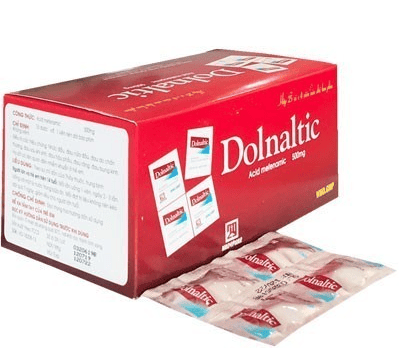This is an automatically translated article.
Becorac belongs to the group of non-steroidal anti-inflammatory drugs, with the ingredient mefenamic Acid 250 mg. Becorac helps relieve pain, reduce fever, treat gout and bone and joint diseases. To ensure the effectiveness when using, users need to follow the instructions of their doctors, and at the same time refer to more information about the uses of Becorac in the following article.
1. What are the uses of Becorac?
1.1 What is Becorac? Becorac is an analgesic, antipyretic and anti-inflammatory drug. Becorac has a drug Visa number-Registration-SDK: VD-28410-17 is a product of Ben Tre Pharmaceutical Joint Stock Company - VIETNAM.
Becorac medicine is prepared in the form:
Packed in a box with 2 blisters, each blister has 10 film-coated tablets. Becorac medicine contains Mefenamic acid 250mg and is packaged in the form of film-coated tablets, 250mg content Becorac drug is recommended for use in adults.
1.2. What are the uses of Becorac? The drug Becorac has the main ingredient Mefenamic acid, used in the treatment to relieve mild to moderate neuropathic pain such as:
Headaches and migraines; Pain due to trauma; Pain after childbirth or pain after surgery ; Toothache; Pain and fever follow inflammatory conditions such as: dysmenorrhea, menorrhagia, spasmodic pain, or pain in the lower abdomen. Becorac is contraindicated in the following cases:
Patients who are hypersensitive to any ingredient or excipient in the drug Becorac. Patients with impaired liver and kidney function.
2. Usage of Becorac
2.1. How to take Becorac The drug Becorac comes in the form of tablets, which should be taken orally. Take Becorac with a sufficient amount of filtered water, should be taken with meals or as directed and prescribed by a specialist. Tablets should not be broken, crushed or mixed with other mixtures for oral administration (especially for slow-release film-coated tablets). Patients do not arbitrarily add or reduce the recommended dose. Carefully read the leaflet that comes with the Becorac box before the patient uses it. 2.2. Dosage of the drug Becorac Usual dose of Becorac: 250mg - 500mg each time x 3 times/day. Each course of treatment should not last more than 7 days. How to handle when missed dose, overdose Becorac:
In case of forgetting dose of Becorac, it is advisable to supplement as soon as possible. However, if it is almost time for the next dose, skip the missed dose of Becorac and use a new dose. When using Becorac drug overdose, the patient should stop the drug immediately and go to the nearest medical facility for timely treatment.
3. Note when using Becorac
Because it can sometimes cause severe gastrointestinal symptoms when used in patients being treated with anticoagulants, special attention should be paid to the appearance and symptoms of the gastrointestinal tract. In case the patient has gastrointestinal bleeding, the drug should be stopped immediately. If diarrhea occurs in association with the use of Becorac, the patient should discontinue treatment. Becorac with mefenamic acid must be used with caution in infections or at risk of infection, even if well controlled, as Mefenamic acid may reduce the body's natural resistance. and fight the infection or mask the usual signs and symptoms of an infection. Safety and efficacy in children under 14 years of age have not been established Extra caution:
If necessary, the dose of Becorac may be reduced in the elderly. In some people, an asthma attack may occur, possibly due to an allergy to aspirin or to non-steroidal anti-inflammatory drugs. Becorac is contraindicated in these cases. When initiating treatment with Becorac, increased monitoring of urinary volume and renal function is required in patients with heart failure, liver failure, chronic renal failure, or the elderly. Taking Becorac may cause dizziness and drowsiness. Therefore, patients should not drive or operate machinery while taking this medicine. In humans, no special malformative effects have been observed. However, more epidemiological studies are needed to definitively conclude that there is no such risk. During the third trimester of pregnancy, all drugs that inhibit prostaglandin synthesis can cause harm to the mother and fetus. Therefore, special care should be taken in this case. If you want to use it, you should consult your doctor before use. Lactation: Non-steroidal anti-inflammatory drugs are excreted in human milk. Therefore, caution and avoid prescribing to women who are breastfeeding.
4. Becorac side effects
During the use of Becorac, patients may still experience side effects such as:
On the gastrointestinal tract:
Diarrhea, nausea accompanied by vomiting and stomach pain. Anorexia, heartburn, abdominal bloating, constipation and gastrointestinal ulcers with or without bleeding. Hypersensitivity reactions:
On the skin: Rash or rash... Inhalation: bronchial asthma attacks may occur in some people, especially those who are allergic to aspirin or non-steroidal anti-inflammatory drugs. other steroids. Renal effects: Renal failure, renal papillary necrosis has been reported in some elderly and dehydrated individuals. Possible limitations: Blood in the urine and difficulty urinating. Effects on hematopoietic organs: Hemolytic anemia, decreased hematocrit, leukopenia, eosinophilia, thrombocytopenic purpura, agranulocytosis, pancytopenia and hypoplasia of marrow. Effects on the central nervous system such as: Dizziness, drowsiness, nervousness, and headache, visual disturbances. Other effects such as: itchy eyes, earache, profuse sweating, mild liver function abnormalities, increased insulin requirements in patients with diabetes, palpitations, shortness of breath, and loss of color vision. recovered upon discontinuation of the drug). If you experience these symptoms, the patient should stop using Becorac and notify the doctor for appropriate treatment.
5. Becorac drug interactions
Concomitant use of Becorac with the drugs listed below, it is necessary to strengthen the monitoring of the clinical and biological condition of the patient. Should not be combined with:
Oral anticoagulants, or injectable heparin: Increases the risk of bleeding, because non-steroidal anti-inflammatory drugs inhibit the function of platelets, and at the same time attack the gastrointestinal mucosa. . If co-administration is required and close clinical or biological monitoring is required. Other non-steroidal anti-inflammatory drugs, including salicylates at high doses: Increased risk of ulceration and gastrointestinal bleeding due to synergistic effects. Lithium (described for many non-steroidal anti-inflammatory drugs): Hyperlithium can reach toxic values, due to decreased renal excretion of lithium. If necessary, monitor blood lithium closely, and adjust the dose of lithium during and after discontinuation of the non-steroidal anti-inflammatory drug. Methotrexate at doses higher than 15 mg per week: Increased hematologic toxicity of methotrexate due to decreased renal clearance. Ticlopidine: Increased risk of ulceration and gastrointestinal bleeding due to synergistic effects. If co-administration is required, clinical and biological monitoring should be enhanced, including bleeding time. Caution in combination:
Diuretics: There is a risk of acute renal failure in dehydrated patients, due to decreased glomerular filtration followed by decreased renal prostaglandin synthesis. Provide water to the patient and monitor renal function during the initial period of combination therapy. Pentoxifylline: Increased risk of bleeding. Clinical monitoring and frequent monitoring of bleeding time are required. Zidovudine: Increased erythrocyte toxicity, due to effects on reticulocytes or severe anemia, occurs after 8 days of non-steroidal anti-inflammatory drug administration. Check blood count and reticulocyte count 8 to 15 days after taking nonsteroidal anti-inflammatory drugs. Note when combining:
Antihypertensive drugs such as: Beta-blockers, ACE inhibitors and diuretics: Reduces the effectiveness of antihypertensive drugs. Intrauterine devices: There is controversy about the potential to reduce the effectiveness of intrauterine devices. Thrombolytics: Increased risk of bleeding. To avoid interactions, before being prescribed Becorac, patients should inform their doctors about all the drugs they are using, including functional foods. The doctor will base on that to prescribe the appropriate Becorac.
6. How to store Becorac
Becorac's shelf life is 36 months from the date of manufacture. Store Becorac in a cool, dry place, at a temperature not exceeding 30°C, in the original packaging and protected from light, away from acidic environments. Keep Becorac out of reach of children and pets. Before taking the drug Becorac should carefully check the expiration date of the drug. Absolutely do not use Becorac after the expiry date printed on the package. Above is all information about Becorac drug, patients need to carefully read the instructions for use, consult a doctor / pharmacist before using. Absolutely do not arbitrarily buy Becorac medicine at home because there may be unwanted side effects.













